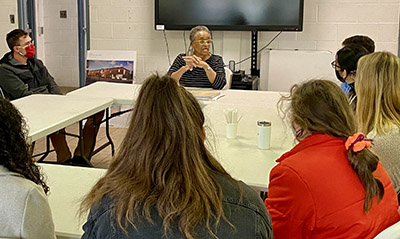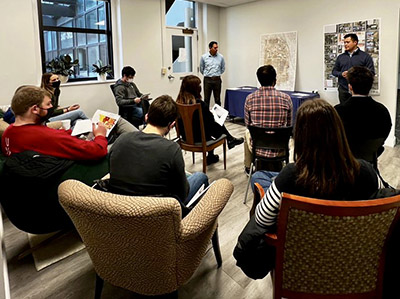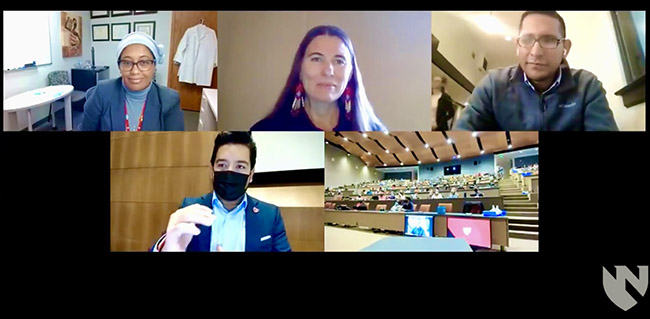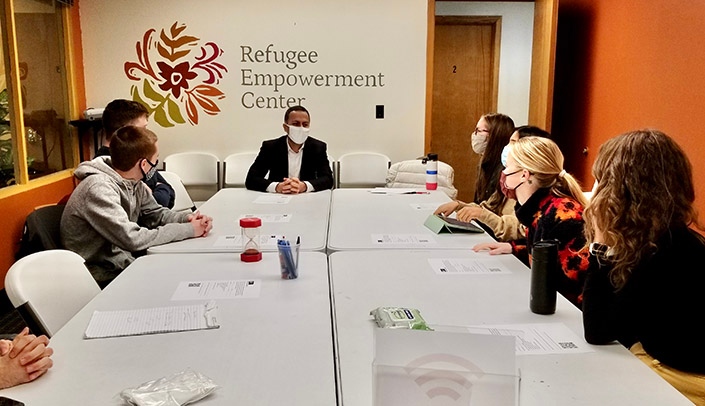First-year College of Medicine students headed out into the community in early November to engage with community leaders, discuss health disparities and explore potential remedies.
The “Community Engagement Day,” an expansion of an event called Highlander Day that was first held in 2019, split up all 132 first-year medical students, sending small groups to 14 community partner sites for presentation and discussions.
 |
| Students meet with Dona Polk, PhD, CEO of the Nebraska Urban Indian Health Coalition. |
Organizer Armando de Alba, MD, called the event a success. He credited Jasmine Marcelin, MD, Rohan Khazanchi, Kelly Caverzagie, MD, and Heidi Keeler, PhD, with the creation of Highlander Day in 2019, which was concentrated in North Omaha. Community Engagement Day, he said, was an expansion of that effort across the city.
“One of my goals was to expand it, to engage the students with different leaders who represent underserved communities across Nebraska — African American, Hispanic, LGBTQ, Native American and other communities,” he said. “We were able to engage several underserved communities, and — in partnership with them — designed, built and conducted the day.”
Pranita Devaraju, president of the first-year class, went to the Nebraska AIDS Project and the Refugee Empowerment Center with her group.
“What we really took away is that what we do has larger implications on the community,” Devaraju said. “By focusing only on the people we see at the hospital, we miss people who may not have access. This event left us thinking about ways not only to include these people in the conversation but also get them access. It was invaluable to us.
“We got to speak — in a group and having smaller conversations with specific representatives from the community — and it was eye opening.”
That was the purpose of the day, Dr. De Alba said: To let students speak to community leaders and to expose them to individual and systemic issues encountered by members of underserved communities.
“This is how we empower learners to address systemic challenges through community engagement as future health care providers,” he said. “The real success of the day was that we were able to design and implement an academic program both engaging our students and the community during this pandemic, a challenge many programs have been facing. The fact that the event was so successful is a tribute to our planning, our partners and, of course, our students.”
Following the meetings, students returned to a classroom at the Sorrell Center to debrief, with each group’s representative recapping the experience and discussing what the group learned.
“They were so enthusiastic about sharing their experiences and enthusiastic about going back out into the community,” Dr. De Alba said.
 |
| Cesar Garcia, executive director of Canopy South, speaks to medical students. |
The event finished with a virtual forum — “Perspectives on Addressing Health Equity in Omaha from Clinical Practice to Population Research and Policy Development.” UNMC’s Nada Fadul, MD, spoke on the clinical practice perspective. UNMC’s Regina Idoate, PhD, assistant professor of health promotion, discussed population research, and State Sen. Tony Vargas spoke on policy development.
“All of these topics are aligned with the levels of determinants of health — not only individual biological factors but community, and social/economic/political factors,” Dr. De Alba said. “One of the intentions of the forum was to give the students knowledge on how to apply these concepts in their future practice.”
 |
| The event closed with a virtual panel featuring (clockwise from top left) Nada Fadul, MD, Regina Idoate, PhD, State Sen. Tony Vargas, UNMC College of Medicine students and moderator Armando De Alba, MD. |

It was wonderful partnering with the College of Medicine on this project. The UNMC Office of Community Engagement looks forward to continuing this partnership, and in helping others across UNMC build their own community-engaged projects.